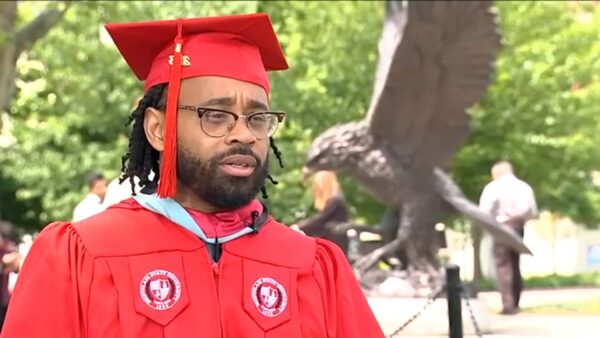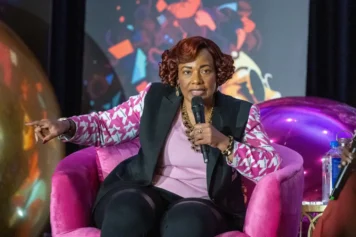A Newark single father has impressed his community by working three jobs, solo parenting, and earning a graduate degree in educational leadership. The dad says “determination” and “drive” are the key elements to his success, adding that his son was his “why.”
Desmond Durham graduated from Montclair State University on Tuesday, May 23. His mom, family, and son were there for graduation. While the day was exciting with the scholar delivering the commencement speech during the university’s College of Education and Human Services graduation ceremony, reaching this milestone was not easy.

He spent a lot of days managing his schedule and burning the night oil to complete his program.
His teacher, Rachel Garver, a professor at Montclair State, watched him struggle and marveled at how focused on success he was.
“I knew how much he had on his plate and was impressed with everything he was able to handle and hand in such quality graduate school work,” Garver said.
The program he completed is called the Newark Montclair Leadership Pipeline Program, a partnership between the Newark Board of Education and Montclair State University.
The mission of the program is “to cultivate school leaders who are trained specifically to serve the district and the Newark community.” Durham got into the program because he is already serving the district in multiple ways.
The 36-year-old balances teaching young people during his days with coaching adults at night as they prepare for their GEDs. In between grading papers, and preparing lesson plans, Durham also found time to be the district coordinator for the Newark Elementary basketball program for the community.
With his young son watching, he modeled what a leader looks like and what it takes to accomplish a goal, saying in an interview with ABC 7, “Dedication, hard work and long days, long nights, it’s the will,” that kept him going.
For the Jersey teacher, while the “will” kept him motivated, his son played a key role in him reaching his goal.
“My son, he’s my why and he’s the reason why I execute,” Durham explained. “When he’s looking at me I gotta keep moving.”
Durham wants to one day be a high school principal in Newark. Currently, according to NJ.com, he is a health and physical education teacher at Barringer High School.
In order to become eligible for that administrative position, one that would move Durham from the classroom to the school office, he would have to have a master’s degree “in one of the recognized fields of leadership or management,” according to the New Jersey Department of Education.
He would also have to enroll in an internship requirement, exhausting 300 hours at a school or organization with an approved program for preparing school principals, and also pass a certification test.
Lastly, a candidate would have to “complete five years of successful educational experience under a valid provisional or standard New Jersey or equivalent out-of-state certificate.”
Earning his master’s degree was a step for Durham in this direction.
One of the reasons Durham has taken the steps to become a school official is because of his students — and what it would mean to them because of the lack of Black teachers in his city.
“I want to be that positive light for students,” Durham said. “I want them to see someone who looks like them and see opportunity. That’s what it’s all about, helping others see their full potential and helping them maximize it. And that’s what’s in my heart, that’s what I want to be.”
Newark, a city where 48 percent of the population is Black, does have significant number of teachers Black and Hispanic teachers.
According to Chalkbeat, “About 57 percent of teachers last school year were Black or Hispanic, compared to more than 89 percent of students.”
New Jersey, a state known for diversity, has the second-largest diversity gap between teachers and students nationwide. It is tied with Delaware and only beaten by California.
The statistics are startling. According to NJ Advance Media analysis of state data for the 2020-21 school year, nearly half of New Jersey public schools don’t have even one Black teacher.
Close to 60 percent of the state’s student population is Hispanic, Black, or Asian, but only 17 percent of teachers are.
Even fewer are principals, according to a study from the National Association of Secondary School Principals.
Statistics show that in 2017, 22 percent of all principals in the country identified as non-white.
Durham, whom many are calling a super dad to his 9-year-old, is dedicating his life to diversity and representation in the classroom and in administration.
He knows firsthand what the impact of Black teachers or administrations means to students.
His mentor, Matthew Brewster of the Newark Board of Education, was also his elementary school teacher.
Brewster acknowledged the significance of his graduation because of what it says to a community that is often underestimated.
“Anything is possible for any kid in Newark, if you go to school, if you apply yourself, keep your head on straight, and avoid the pitfalls life has for you,” Brewster said, adding, “There are great things that can come about.”
Another mentor, Gary Taylor, who met him when he was in ninth grade at Newark’s West Side High School, said he was not shocked at his success. Taylor said he always knew him to be exceptional and used to tell other students to look at Durham as a role model — even when he was a teen.
More than anything, Durham’s graduation made the mentor feel good that his protege did not become a stereotype or warped statistic.
“To see a Black man come up like this and not be a victim to the things in our communities that can sidetrack you,” Taylor simply says makes his heart smile.
Durham is one of eleven scholars in his graduating cohort from Montclair. Of the district’s “ promising” leaders, the program boasts that more than half are people of color.


